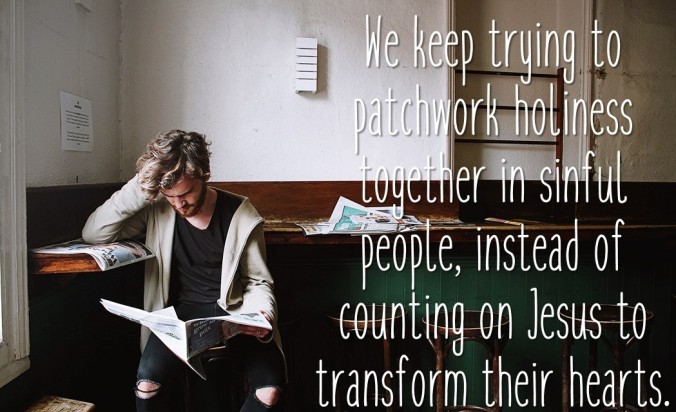
My mother claims that if she had sent me to a liberal university, I’d have come out a fiery, ardent conservative.
She’s right about one thing: I’m not afraid to be the minority opinion. Whether I actively oppose whatever culture I’m immersed in is up for debate, but she’s right that she didn’t exactly get what she’d bargained for when she sent me to a Christian school. Sending your kid to a conservative Christian university doesn’t typically make them less politically and socially conservative than when they started. But what’s weirder is how lost I became in my first two years at a Christian school.
I succumbed to an idol stronger and more all-encompassing than ever before.
I was close to so many Christians and I’d never felt farther from God.
Ironically, I was lost at school, but I was found miles from campus.
My journey over the last four years at a prominent Christian university has taught me just how wrong my preconceived notions of a “Christian” school were before I enrolled. I love my school, but I started my freshman year with quite a few misguided ideas about what a “Christian college” would be like.
Here are some of the biggest “myths” about Christian universities that I had to unlearn.
1. You will grow spiritually.
Maybe you will, maybe you won’t – shockingly, that’s still up to you and God.
Sometimes, being surrounded by a “Christian culture” can make it easy to get complacent. You talk about God all the time, right?
But it’s easy to talk about God a lot, without actually talking to Him.
There’s an assumption that you’ll grow by osmosis – you’re surrounded by so much spiritual stuff that you’re bound to pick up on some of it. Throw that much at the wall and some of it is bound to stick.
That culture of complacency can be surprisingly difficult to fight against. When your professors pray before every class, your RAs tell their testimonies at hall meetings, and you hear “God is in control!” as much as you hear “Study hard!” it’s easy to just go through the motions. It’s easy to speak the Christian lingo and learn the worship hand motions without actually growing at all.
It’s easy to let all these Christians’ voices drown out His.
Is there opportunity for growth? There always is. It’s not that He doesn’t use Christian schools; it’s just that He doesn’t use them any more than other circumstances that His grace redeems.
2. Everyone thinks alike.
One of the most frustrating things I’ve experienced as I’ve grown and changed over the course of my time at school has been the assumption that I agree with everything my school does or says. I go to a nondenominational evangelical Christian university, and it’s diverse. Ethnically, culturally, socially, politically, and theologically. We all take the same set of Bible and theology classes, but even among the most general tenants we are taught, there are students that disagree. I have roommates with very different theological and political beliefs, and we enjoy discussing them. My mind has been widened, my beliefs strengthened and sometimes revised, and my appreciation for contrasting viewpoints has increased.
3. You don’t need to go to church on Sunday, because you basically go every day at school.
This is one of the hardest things – articulating the deep importance of church to a group of students who feel like their semester is pretty much “church.” Part of the problem is the cheapened performance we’ve allowed to fill our Sundays. When kids “grow up in the church,” we’re often taught that going to church is about downloading a sermon-length set of facts about God and checking off another Christian duty. So it should come as no surprise that the need for church disappears when we start downloading class-length sets of facts about God and praying with our professors instead.
Better yet, the programs at school are even easier than real church – there are no screaming babies, no sermons with outdated references, and no awkward potlucks. No one will ask you to do something uncomfortable or inconvenient, like teach the kindergarten Sunday school or clean the kitchen.
After a semester of church-hopping, I finally settled on a church about 20 minutes away from my school. (Quite the trek, considering the number of churches surrounding it.) Finding a church with messy kids and elderly greeters requires I drive past all the “hip” churches that close down in the summer when all the students leave.
I’ve relearned what church is. It’s getting up at the crack of dawn to scatter Easter eggs on a muddy lawn. It’s hugging old ladies and shaking the hands of old men. It’s hearing a sermon that doesn’t 100% apply to your life right now. It’s pulling weeds and washing windows and it’s being committed to people that aren’t like you. It’s dealing with the messy and the uncomfortable. Pre-class prayers, lights-and-camera speakers, and Christian recording artists can’t give you that. And more importantly, you can’t give them anything.
4. You’ll meet your spouse at school.
I’ve got a semester left before I’m doomed to eternal singleness.
I remember my first week at my school like it was yesterday: a group of six freshmen girls, squished onto a tiny dorm room floor, breathlessly explaining our dreams and goals. Our “prayer leader,” a junior (with a boyfriend!) asked us what we wanted to do after we graduated. “Law school,” I started. The girl next to me uneasily glanced at her feet. “Well, I…I’m kind of hoping I won’t graduate.” I looked around the circle, and realized I was the only one that looked confused. “Me too!” The room erupted in agreement and knowing smiles. Turns out, at least three of my fellow freshmen were hoping to get married and quit school before their senior year rolled around.
Four years later, none of them are married. They’re all about to graduate, and based on our limited conversations since then (and some fruitful Facebook stalking), are passionate and accomplished individuals in their fields.
If I can say one thing to all of my fellow Recovering Good Girls, it’s this:
Genesis doesn’t say one-half and one-half becomes one.
You are not half of a human being, navigating the world lopsided until you find your illusory “other half.” You are complete in Him only.
5. I hate my Christian school.
(Okay, so maybe this “myth” isn’t very widespread. But I personally know many people that believe it!)
I love my school, even as I criticize its actions or the statements of its leaders.
I’m still figuring this messy life out. I’m still figuring out what I believe and how to express it in a loving and fruitful way.
I was strangled by idols in the middle of the most “Christian” environment I’ve ever lived in, and I found freedom in a God that met me on a bumpy bus ride miles from my school.
But I wouldn’t trade my experience for anything.
I’ve been given incredible opportunities to lead and teach. I’ve learned from wise and godly people. I’ve learned the dirty secrets of a people still learning to admit our own brokenness.
And I’ve learned to love His Church, even when I don’t feel like it.










